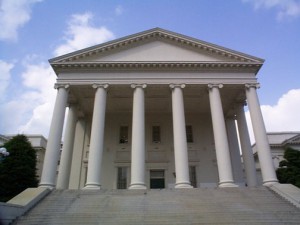Front Porch Blog

Clean energy is a major area for potential policy changes during this year’s General Assembly session. Here is a roundup of energy bills to watch.
Clean energy is a major area for potential policy changes during this year’s General Assembly session.
Governor Terry McAuliffe touched on the subject in his State of the Commonwealth speech last week, pledging to “stimulate economic growth by expanding our use of renewable energy” and touting recent commitments that amount to a 100-fold increase in solar generated in the state.
Still, some of the most exciting measures that legislators are considering face significant challenges. Here is a roundup of energy bills to watch.
Solar Power Solutions
Legislators who are allied with our clean energy agenda admit there are barriers to making meaningful change during this session. In a radio interview last week, Senator Creigh Deeds invoked lyrics from a familiar Talking Heads song to describe the partisan divide: “Same as it ever was.” This sentiment pointedly captures utility companies’ opposition to basic provisions governing customer freedom to select clean energy options and others aimed at reducing wasted energy in Virginia.
Last month, we discussed the vital need to legally clarify that it is legal in Virginia for an electricity customer to enter into an agreement to purchase power from a company than can install a renewable energy generating system on their property. Power Purchase Agreements can encourage arrangements that involve no upfront cost for the customer, present attractive cost-saving opportunities for schools and churches, and avoid more costly forms of generation while relieving grid congestion, among other benefits to the whole customer base. SB 139, SB 140, SB 148, HB 618 and a bill currently being finalized by Delegate Randy Minchew entitled the Renewable Energy Provisions Bill will all be considered as ways to promote solar affordably in Virginia.
Energy Efficiency Policy Reform
Year after year, one roadblock that has kept Virginia from improving energy efficiency is the fact that state regulators evaluate proposed energy efficiency programs using a flawed process. This method practically guarantees that the most thorough demand management measures, such as home and business assessments, will be denied. This results in fewer cost-saving options for customers and perpetuates a system that makes rewards utilities for pursuing more expensive ways to meet demand.
A bill sponsored by Delegate Lee Ware, HB 352, could reform these tests to give robust energy efficiency programs a better chance of being approved by the State Corporation Commission. HB 1053 and SB 395 are companion bills that are intended to address another dimension of this problem: in theory, electric utilities that operate energy efficiency programs are allowed to request recovery of the revenue that they have lost from the energy saved, that is, the energy the utility would have sold to customers. But regulators tend to be apprehensive about approving programs that could result in such future costs to ratepayers, and they can turn down programs based on that consideration. Other states have dealt with this by rewarding utilities a lesser dollar figure for the energy they save by running such programs — this a reform that the McAuliffe administration supports and one that should get traction this year.
Who’s Grandstanding Against the Clean Power Plan this Year?
Three bills introduced this year would impede Virginia’s compliance with federal carbon pollution standards and interfere with our path toward a clean energy future. HB 2, SB 21 and SB 482 all would require the General Assembly’s approval of the compliance plan prepared by the state Department of Environmental Quality. This approach is being advocated by the likes of the industry-friendly American Legislative Exchange Council (ALEC), which recently lost American Electric Power as a member, apparently because of this very issue.
Governor McAuliffe expressed his intention to veto such legislation should both houses approve it, which is good news for the state’s economic and clean energy outlook. Even a consulting firm that Virginia’s utilities often look to has shown that the Clean Power Plan will reduce customer bills and grow clean energy, a sector that created $3.9 billion in revenue in Virginia in 2014.
Ensuring a Strong, Beneficial Clean Power Plan with the Virginia Coastal Protection Act
HB 351–SB 571 is the bipartisan Virginia Alternative Energy and Coastal Protection Act, which would authorize our state to join a carbon trading program with other states, providing more than $250 million in the first year through the auction of emission allowances. These funds would be divided to combat the effects of worsening sea-level rise, support energy efficiency and renewable energy projects, and assist with economic development in Southwest Virginia.
Take a moment to fill your legislators in on the energy issues that matter to you most. Visit the General Assembly’s website and pull down the blue tab from the top of the page to look up who represents you, find email addresses for your state delegate and senator, search bills introduced this session and familiarize yourself with the civic process that determines Virginia’s energy policy. Then buckle up for a fast two-month-long General Assembly session!
Stay informed by subscribing to the Front Porch Blog.
PREVIOUS
NEXT
Related News

Leave a comment
Your email address will not be published. Required fields are marked *

Leave a Comment